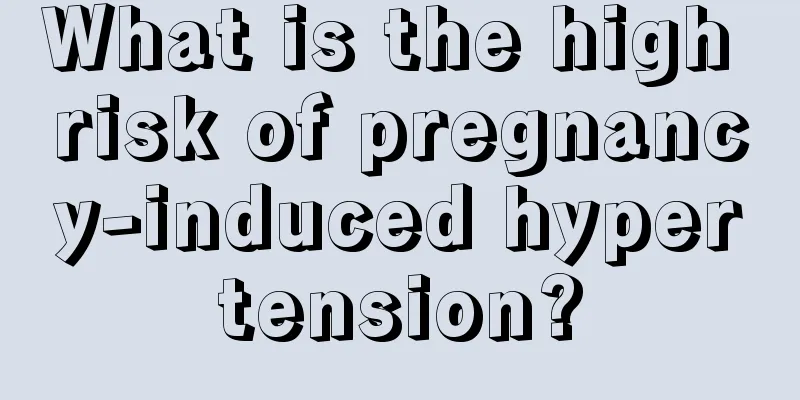What is the high risk of pregnancy-induced hypertension?

|
Preeclampsia is also known as pregnancy-induced hypertension. Hypertension is a medical disease in itself. Once it occurs, it is irreversible and there are many complications of the disease itself. However, for pregnant women, suffering from high blood pressure will cause different symptoms and complications, increase the risk of pregnancy and delivery, and have different harms to the child and the pregnant woman herself, so the harm of the symptoms is quite large. The risk of gestational hypertension is high, which is a test result for the prediction of gestational hypertension during pregnancy checkups, meaning that the pregnant woman is prone to gestational hypertension during pregnancy. Pregnant women may experience symptoms such as high blood pressure, edema, proteinuria, dizziness, and blurred vision. If the condition worsens, it may cause eclampsia, cerebral hemorrhage, etc., and in severe cases it may seriously endanger the lives of mothers and babies. In order to understand and appreciate the risks of hypertension during pregnancy, it is also necessary to understand the clinical manifestations of the disease, and the pain it will cause to patients and children in the later stages. As our understanding of health improves, we also need to manage our food, clothing, housing and transportation in our daily lives and lead a healthy life. If a woman develops symptoms of hypertensive edema and proteinuria after 20 weeks of pregnancy, she needs to be alert to whether she has gestational hypertension. Generally, if this disease is diagnosed, the patient sometimes has no symptoms but sometimes has dizziness. The presence of dizziness will also be accompanied by a slight increase in blood pressure. If the pregnancy hypertension is severe, the patient may experience headaches, decreased vision, and some gastrointestinal symptoms, nausea and vomiting. Do not think that this is a normal reaction to pregnancy. In fact, pathophysiological changes have already occurred at this time, and the patient will also experience persistent upper abdominal pain. If you do a urine test, you can find a lot of proteinuria and the body's edema will continue to increase. Hypertension during pregnancy can also cause certain harm to the fetus. If the symptoms are moderate to severe, insufficient blood supply will lead to fetal distress, premature birth or stillbirth, and the incidence of neonatal death will increase. The occurrence of hypertension during pregnancy is a precursor to preeclampsia. Once combined with preeclampsia, the pregnant woman may lose her life in serious cases, so the pregnancy should be terminated immediately. Because severe preeclampsia can cause blood clotting disorders and cerebrovascular disease, which can lead to different symptoms of cardiovascular and renal organ failure. |
<<: Can gestational hypertension last until full term?
>>: After my milk was swollen, I took a nap and the milk stopped flowing
Recommend
What is the normal thickness of the endometrium?
Changes in endometrial thickness occur during a w...
Is yellowish brown vaginal discharge harmful?
Leucorrhea is a viscous liquid secreted by the fe...
What is the best medicine for women with anemia?
Anemia is a relatively common disease. The incide...
What causes dark circles under women's eyes?
Dark circles are a very common phenomenon in life...
Simple ways to make your period come faster
What are some simple and clear ways to make your ...
Several types of vaginitis in women
After a woman gets married, she is prone to vario...
Pregnant women dream of red apples, it means a boy
Apple is a common fruit in our daily life and is ...
Can pregnant women eat raw fish?
Pregnant women can eat sashimi, but not too much....
Why is the pizza not stringy? How to make semi-finished pizza
Pizza, also known as pizza, pizza, pizza, pizza, ...
What causes white spots on women’s nails?
Nowadays, women love beauty very much and usually...
A collection of five solutions for beautiful breasts
Sagging breasts in girls are actually caused by m...
Why is my stomach hard when I am nine months pregnant?
Some pregnant women will experience abdominal tig...
What are the causes of lobular hyperplasia?
Lobular hyperplasia of the breast is a relatively...
How to have sex during ovulation to get pregnant most easily
The easiest time for women to get pregnant is whe...
Are snow lotus seeds and sapodilla rice the same thing? How to extract sapodilla rice from dried sapodilla
Saponin rice, commonly known as snow lotus seeds,...









